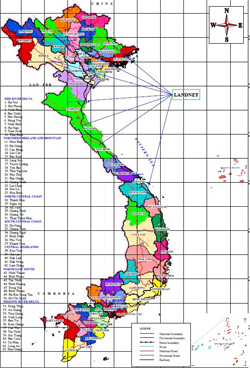On April 17, the People’s Committee of Dong Thang teamed up with CIRUM to talk on “How to make use and well manage herbal medicinal plants from natural forests in Dong Thang commune“. The occasion was attended by representative of Dinh Lap’s Herbal Healers Association, leaders of Dong Thang People’s Committee, local health care station, village elders and leaders, herbalists as well as traditional healers from Bac Lang Commune. The reason for this gathering was to discuss the loss of herbal medicinal plants in the commune, the related loss of local knowledge on using herbal products as medical remedies and to discuss solutions for managing and preserving herbal medicinal plants sustainably.
Dong Thang used to be well known for its sheer quantity of valuable herbal medicinal plants such as: bau tien, betel leaf, fibraurea tinctoria lour, superworm and Ganodermataceae. But in recent years the commune has witnessed the intrusion of traders of herbal plants, predominantly Chinese,
leading to the loss of these plants’ genetic resources. Also other precious medicinal plants - such as radix morindae, hogweed, cay bo mau, bau tien (cuong do), thau mac luot, one-leaf betel, Na rung, superworm, forest tea, fibraurea tinctoria lour, are currently endangered and at a point of extinction.
On behalf of the commune leaders, Mr. Vi Van Tho who has Tay ethnicity, Deputy Chairman of People’s Committee and Project Management Team Leader presented the objectives of the meeting and discussions were held in groups of commune, village leaders and local healers. These discussions were accompanied by the screening of a documentary on how Herbal Medicinal Healers Association in Bac Lang Commune preserves and develops the herbal sources. Also the chairman of Bac Lang Healers Association, Mr. La Van Loi, shared his experience with the setting up and developing the association. The participants perceived this as a useful model to preserve and manage forests and medicinal sources through local healers.
Based on the discussions, a strategy and an action plan were formulated to increase efficiency in using traditional herbal plants for public healthcare and managing the natural resources via local healers in Dong Thang. Eventually Mr. Vi Van Tho, project management team leader, wrapped up the meeting by reviewing the agreements made during the discussion:
Firstly it was decided that village leaders will soon organise a meeting to reach consensus about establishing community herbal forest conservation areas. To this end, those who know about herbal plants will join in teams (including old and young people) and contribute their ideas and experiences. Second initial activity will be conducting a research on how to use and manage traditional herbal plants from natural forests based on customary law.
Another set of activities will revolve around developing herbal gardens and the set up groups of 3-4 people with knowledge on herbal medicinal plants, who will be in charge of managing and preserving herbal plants in the commune.
An important conclusion of the meeting was that sustainable use of herbal plants resources requires an agreement with commune and village. The management board will hand over responsibilities to a village, which in turn pass them on to an active group of people. This has to be done with a specific mechanism mutually discussed and decided by the community. On the other hand, it is necessary to promote propaganda and advocacy through local meetings attended by many different actors such as senior citizen, women, youth and farmer’s groups. This should raise public awareness and allow to reach consensus.
CIRUM






















